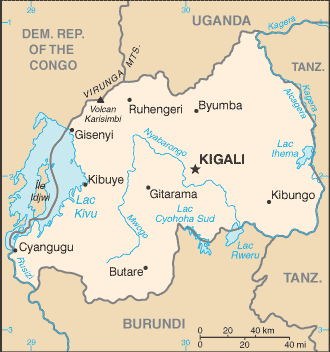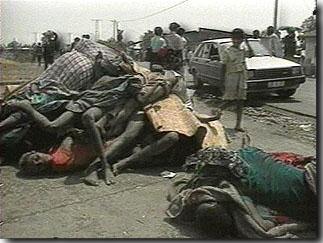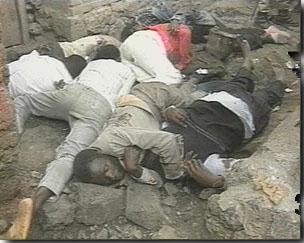SHAKE HANDS WITH THE DEVIL
THE JOURNEY OF ROMÉO DALLAIRE
reviewed by
JOHN GRIFFIN

In
2004, 10 years after the genocide that saw 800,000 souls perish,
a crowd gathered in a Rwandan stadium to mark the anniversary.
There were precious few whites in attendance. One of them was
Romeo Dallaire.
The
Canadian Armed Forces general had been commander of the UN troops
responsible for keeping the lid on the powder keg of tribal
and political unrest in that little-known central African country
in the summer of 1994. Woefully understaffed, his hands tied
by a bureaucracy that cared nothing for the country or its people,
Dallaire chose to stay, save who he could and bear agonized
witness to the slaughter of innocent men, women and children.
 Peter
Raymont’s Shake Hands with the Devil: The Journey
of Roméo Dallaire is the Sundance award-winning
documentary that links the atrocities of 1994 with Dallaire’s
return to the country a decade on, and the man’s personal
emotional turmoil in between.
Peter
Raymont’s Shake Hands with the Devil: The Journey
of Roméo Dallaire is the Sundance award-winning
documentary that links the atrocities of 1994 with Dallaire’s
return to the country a decade on, and the man’s personal
emotional turmoil in between.
Understandably,
it makes for powerful and deeply unsettling viewing. Seen together
with Hotel Rwanda, a recreation of events taken from the same
time, they present portraits of extraordinary individual courage,
and monstrous collective and institutional evil.
“Are
all humans human?” the film asks. Or are some more human
than others?”
Dallaire
was caught in an untenable position in a nightmare scenario
as chief of nothing while bands of maniacs with machetes and
automatic weapons engaged in 100 days of ruthlessly efficient
ethnic cleansing.
Raymont’s
angry but balanced film shows both the unspeakable violence
of archival footage and the transformation a decade can bring
to a verdant land. But because Dallaire is pursued by his own
guilty demons, he sees only corpses, killing fields and terrified
faces. If his visit back to Rwanda was intended as part of the
healing process, it comes at a price.
Shake
Hands with the Devil makes clear the general did everything
humanly possible to alert the great powers in the U.S., Europe
and UN to the tragedy in Rwanda. It makes clear they turned
their heads away and hung him out to dry.
 Dallaire
has since suffered from post-traumatic stress disorder. He’s
attempted suicide, and wrestled with devils no one should ever
have to face. Agreeing to open himself up for the filmmakers
is only the most recent example of bravery in a man whose only
crime was to be human when all around had forsaken theirs.
Dallaire
has since suffered from post-traumatic stress disorder. He’s
attempted suicide, and wrestled with devils no one should ever
have to face. Agreeing to open himself up for the filmmakers
is only the most recent example of bravery in a man whose only
crime was to be human when all around had forsaken theirs.
John
Griffin is the film critic at the Montreal
Gazette where this review was originally published.